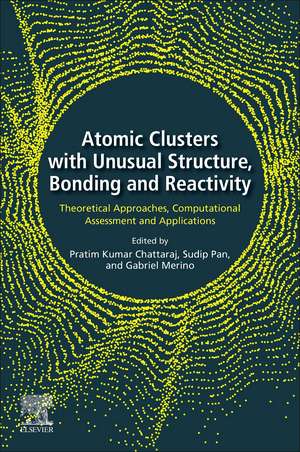Atomic Clusters with Unusual Structure, Bonding and Reactivity: Theoretical Approaches, Computational Assessment and Applications
Editat de Pratim Kumar Chattaraj, Sudip Pan, Gabriel Merinoen Limba Engleză Paperback – 10 oct 2022
Drawing on the knowledge of its expert editors and contributors, this book provides a detailed guide to ascertaining the stability, bonding and properties of atomic clusters. Atomic clusters, which exhibit unusual properties, offer huge potential as building blocks for new materials and novel applications, but understanding their properties, stability and bonding is essential in order to accurately understand, characterize and manipulate them for further use. Searching for the most stable geometry of a given cluster is difficult and becomes even more so for clusters of medium and large sizes, where the number of possible isomers sharply increase, hence this book provides a unique and comprehensive approach to the topic and available techniques and applications.
- Introduces readers to the vast structural and bonding diversity that clusters show and reflects on their potential for novel application and material development
- Highlights the latest computational methods and theoretical tools available for identification of the most stable isomers and accurate analysis of bonding in the clusters
- Focuses on clusters which violate the rules established in traditional chemistry and exhibit unusual structure, bonding and reactivity
Preț: 1006.30 lei
Preț vechi: 1313.82 lei
-23% Nou
Puncte Express: 1509
Preț estimativ în valută:
192.55€ • 200.65$ • 159.44£
192.55€ • 200.65$ • 159.44£
Carte tipărită la comandă
Livrare economică 27 martie-10 aprilie
Preluare comenzi: 021 569.72.76
Specificații
ISBN-13: 9780128229439
ISBN-10: 0128229438
Pagini: 444
Ilustrații: 150 illustrations (10 in full color)
Dimensiuni: 216 x 276 mm
Greutate: 1.03 kg
Editura: ELSEVIER SCIENCE
ISBN-10: 0128229438
Pagini: 444
Ilustrații: 150 illustrations (10 in full color)
Dimensiuni: 216 x 276 mm
Greutate: 1.03 kg
Editura: ELSEVIER SCIENCE
Cuprins
Part 1: Introductory Information About Experimental and Theoretical Tools in Cluster Chemistry
1. Introduction to Cluster Chemistry
2. The Essence and Application of Global Minima Searching Code in Cluster Chemistry
3. Modern Experimental Techniques to Generate and Characterize Atomic Clusters
Part 2: Unusual Structural Diversity in Clusters
4. Clusters with Planar Tetracoordinate Carbon
5. Clusters with Planar Pentacoordinate Carbon and beyond
6. Boron Nanorotors in Cluster Chemistry
7. Boron Buckyball and Reactivityin Cluster Chemistry
8. Clusters with Ultrashort Bond Distance
9. Molecular Stars in Cluster Chemistry
10. Highly Symmetric Nanoclusters
11. Zwitterionic Clusters
12. Bimetallic Clusters: Effect of Doping on Stability and Reactivity
13. Inorganic Double-Helix in Cluster Chemistry
14. Nanowheels in Cluster Chemistry
15. Sandwiches and Inverse Sandwiches in Cluster Chemistry
Part 3: Reactivity and Application of Clusters
16. Clusters with Reactivity towards Noble Gas
17. Carbon Monoxide and Dinitrogen Fixation by Clusters
18. Clusters with Catalytic Property
19. Superalkali and Superhalogen Property of Clusters
20. Cluster Assisted Water-Splitting
21. Relativistic Effects Induced Reactivity in Gold Clusters
22. Hydrogen Storage Perspective of Clusters
1. Introduction to Cluster Chemistry
2. The Essence and Application of Global Minima Searching Code in Cluster Chemistry
3. Modern Experimental Techniques to Generate and Characterize Atomic Clusters
Part 2: Unusual Structural Diversity in Clusters
4. Clusters with Planar Tetracoordinate Carbon
5. Clusters with Planar Pentacoordinate Carbon and beyond
6. Boron Nanorotors in Cluster Chemistry
7. Boron Buckyball and Reactivityin Cluster Chemistry
8. Clusters with Ultrashort Bond Distance
9. Molecular Stars in Cluster Chemistry
10. Highly Symmetric Nanoclusters
11. Zwitterionic Clusters
12. Bimetallic Clusters: Effect of Doping on Stability and Reactivity
13. Inorganic Double-Helix in Cluster Chemistry
14. Nanowheels in Cluster Chemistry
15. Sandwiches and Inverse Sandwiches in Cluster Chemistry
Part 3: Reactivity and Application of Clusters
16. Clusters with Reactivity towards Noble Gas
17. Carbon Monoxide and Dinitrogen Fixation by Clusters
18. Clusters with Catalytic Property
19. Superalkali and Superhalogen Property of Clusters
20. Cluster Assisted Water-Splitting
21. Relativistic Effects Induced Reactivity in Gold Clusters
22. Hydrogen Storage Perspective of Clusters
